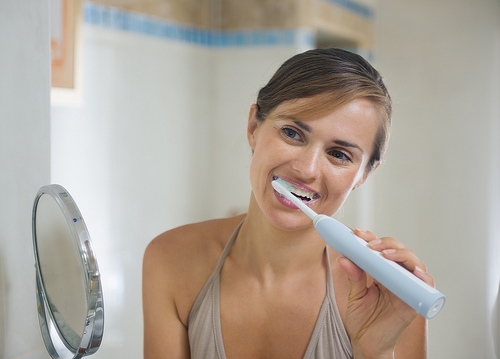Brushing: Before or after breakfast?
November 6th, 2018

In a perfect world, we would all jump out of bed ready to greet the day with a big smile and a toothbrush close at hand to clean our teeth immediately. But if you can’t even find your toothbrush before you’ve had your first cup of coffee, does it really make a difference if you brush and floss after breakfast? Perhaps! Let’s talk biology.
Normal saliva production during the day benefits our teeth and mouths in surprising ways. Saliva washes away food particles to keep our teeth cleaner. It contains cells which combat bacteria and infection. It even provides proteins and minerals to help protect our teeth from decay. But saliva production slows dramatically as we sleep, and the amount of bacteria in our mouths increases. While one of the nasty—and obvious—side effects of bacterial growth is morning breath, there is an invisible effect, which is more harmful. Bacteria in plaque convert sugar and carbohydrates into acids which attack our gums and enamel and can lead to both gingivitis and cavities.
- If You Brush Before Breakfast
Brushing and flossing first thing in the morning removes the plaque that has built up during the night and takes care of many of the bacteria who are ready to enjoy the sugar and carbs in that breakfast with you. If you brush before eating breakfast, rinse your mouth with water after your meal, floss if needed, and you are good to go.
- If You Choose to Brush After Breakfast
But if you decide that doughnut simply can’t wait, you should ideally postpone brushing for 20-30 minutes after your meal. Of course, these are minutes in which bacteria can make use of those new sugars and carbohydrates. So why shouldn’t you brush immediately after eating? Many foods and beverages, especially acidic ones such as grapefruit and orange juice, can weaken the surface of your teeth. If you rinse with water after eating and wait at least 20-30 minutes before brushing, your enamel will be “remineralized” (another benefit of saliva) and ready for cleaning.
No matter if you take a “seize the day” approach and brush first thing in the morning, or a “seize the doughnut” approach and brush soon after eating, the important word here is “brushing.” Drs. Maoloni and Pope and our Flossmoor and New Lenox, IL team are happy to make suggestions as to the best morning routine for you. One thing is certain: if you give your teeth and gums two minutes of careful brushing and flossing in the morning, you can’t help but start your day off right!





 Website Powered by Sesame 24-7™
Website Powered by Sesame 24-7™